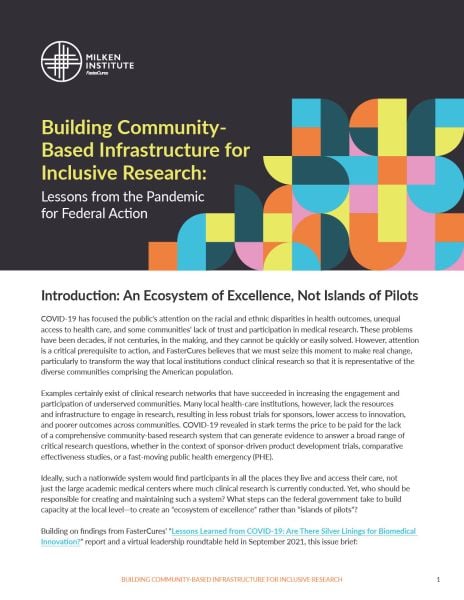
Building Community-Based Infrastructure for Inclusive Research: Lessons from the Pandemic for Federal Action
COVID-19 has focused the public’s attention on the racial and ethnic disparities in health outcomes, unequal access to health care, and some communities’ lack of trust and participation in medical research. These problems have been decades, if not centuries, in the making, and they cannot be quickly or easily solved. However, attention is a critical prerequisite to action, and FasterCures believes that we must seize this moment to make real change, particularly to transform the way that local institutions conduct clinical research so that it is representative of the diverse communities comprising the American population.
Examples certainly exist of clinical research networks that have succeeded in increasing the engagement and participation of underserved communities. Many local health-care institutions, however, lack the resources and infrastructure to engage in research, resulting in less robust trials for sponsors, lower access to innovation, and poorer outcomes across communities. COVID-19 revealed in stark terms the price to be paid for the lack of a comprehensive community-based research system that can generate evidence to answer a broad range of critical research questions, whether in the context of sponsor-driven product development trials, comparative effectiveness studies, or a fast-moving public health emergency (PHE).
Ideally, such a nationwide system would find participants in all the places they live and access their care, not just the large academic medical centers where much clinical research is currently conducted. Yet, who should be responsible for creating and maintaining such a system? What steps can the federal government take to build capacity at the local level—to create an “ecosystem of excellence” rather than “islands of pilots”? Building on findings from FasterCures’ 'Lessons Learned from COVID-19: Are There Silver Linings for Biomedical Innovation?' report and a virtual leadership roundtable held in September 2021, this issue brief:
-
Highlights best practices from organizations that are leading the way in community-based clinical research;
-
Identifies common infrastructure gaps that exist at the community level and how we can build engaged, interoperable health systems in research moving forward; and
-
Pinpoints national policies and resources needed to strengthen critical infrastructure at the community level to empower local institutions to participate in clinical research.

